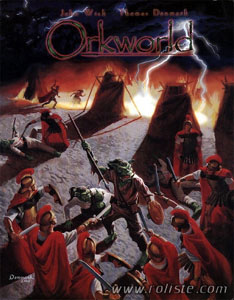This 3-part series was originally written in November 2000, shortly after the release of John Wick’s Orkworld. I shopped it around to a few gaming periodicals, but the game never became popular enough to justify several thousand words and the article never sold. Although it is perhaps most interesting to those who remember the exceptionally evocative Orkwold, I think there’s interest here for anyone running a fantasy campaign.
This is the story of Fanal the Swordbearer; Fanal the Mowgd Bane; Fanal the Bashthala. When told by the talda of the North it is a story of hubris and stupidity. When told by the Eastern tribes it becomes a parable of the Harsh Times. To the bards of the West it is known as a story of tala, the false heroism of foolishness. And in the South the story of Fanal is forgotten as the detritus of an ignoble age.
But here, in the lands of the Long Winter Glen, it is a tale of fanu – of a strength which can only be found in the strongest of hearts in the moment of wa. The story of a hero who rose above the limitations of his flesh and his people, and who truly earned his name and his heritage. Here Fanal is not forgotten or dismissed, but remembered as the ork he was – an ork whose strength of spirit serves still as a reminder of our common plight; of the thala which make up our lives, and the solutions which may be found even in the face of adversity and hopelessness.
In years long since gone by, it came to pass that three of creation’s fiends walked along a common path: Atheleyaendroovalsai of the Ahlvsees; Burgon al’Kalthorn, Lord of the Eastern Shtontee; and Petrus of the Manoo. Each sought the might of the Gray Spear, crafted in the days before legend and housing a shard of Bashthraka’s soul within a spearhead made of the metal of Iron Lake, for their own selfish reasons. Athvalsai would use it as a means of laying waste to his comrades. To Petrus it would reveal our secret magicks. For Burgon al’Kathorn its sacred metal would be transformed upon his forge into a mundane blade.
First they sought to seize the spear through force of arms. Each of them – man, dwarf, and elf – brought to the field their private armies, and welded them into a single whole: The Army of the Triad. But in these times the Gray Spear was wielded by Kalabak, the greatest of the thraka, the eldest son of the Household of Tildahn, and the most revered ork among the Nine Houses of the Thrush. In his hands it had vanquished a thousand foes, and washed the Plains of Pain red with the blood his enemies. When the Army of the Triad marched against the House of Tildahn, it was driven back.
And so, to wrest it from the mighty grasp of Kalabak, these three joined in conspiracy and conceived a plan bred of mowgda and seeded with the treachery of man, the poisoned soul of dwarf, and the twisted ambition of elf.
In this season, Kalabak was the eldest of three sons. Next came Fanal. And last came Travlesan. In seeing this, the three conspirators conceived their mischievous plans. With the arcane magics of the elves, they cloaked themselves behind the faces of the gods: The dwarf as Bashthraka, the elf as Pugg, and the man as Gowthdukah.
Each conspirator, in turn, went to one of the brothers: Kalabak saw Bashthraka come to him as he hunted the wild deer. Travelsan was visited by one who bore the countenance of Pugg as he labored at the forge. And Fanal, as he was wont to do, had gone far from home in his wanderings, and was reached last by the figure of Gowthdukah.
Each of the three brothers was told the same lie: That there was a companion to the Gray Spear, which had been lost many years before. But that the god had finally uncovered the secret of its hiding place, and the spear could now be gained… if only they would follow the god to its hiding place.
Kalabak dreamed of glory redoubled. Travlesan of matching the exploits of his elder brother. Fanal of the great deeds which could be done with such a weapon.
Kalabak and Travlesan were the first to reach the accursed grove which the three conspirators had chosen: Perched in silver moonlight upon the tallest cliff. Athvalsai weaved his spells, and the true faces of the brothers were concealed from each other – and they warred with each other over a prize which had never been. Travlesan fell that night, and Kalabak’s blade was stained with the crimson of his own blood.
As Travelsan’s body slipped from the Gray Spear’s shaft, Fanal arrived within the grove – and would have shared his brother’s fate if chance had erred but slightly. But Fortune was with Fanal that night, for in disguising himself as Gowthdukah, Petrus had also opened his mind to the god’s own soul. Looking out over the devastation which had been wrought, Gowthdukah reached through the man and stripped the fiction from Fanal’s vision. Seeing one brother slain by another, Fanal cried out in horror – and in that instant the spell was broken upon Kalabak as well.
Kalabak looked down and saw what his hand had wrought. Next he looked within his soul, and found a shard of mowgda there. And he was ashamed. He cast the Gray Spear down, and filled with the anguish of his deeds, he fled over the cliffs to his doom.
Fanal, seeing still with true sight, saw all of the deception revealed. Reaching down with fury in his heart, he claimed the Gray Spear as his own and slew the man.
Seeing their failure writ in the death of their comrade, the dwarf and elf withdrew to scheme and plot their revenge. They drew to themselves, once more, the Army of the Triad and came again to crush the newly weakened house and claim the Gray Spear as their own.
But Fanal, fresh in his rage, laughed with the strength of keerisboon and rallied the Nine Houses to his cause. And thus was born the Second Battle of the Triad.
The fighting lasted all of the day, and into the night, and into the next day, and into the next night. But as the dawn of the third day arose, it came to pass that Fanal and the elf Athvalsai met each other upon the battlefield. Both were wearied beyond the bounds of mortal flesh. Both longed for rest. But both knew that their hour of truth had arrived.
Their battle lasted all through the day and deep into the next night. Fanal’s skill was too great for the elf to strike his lethal blows. The evil Athvalsai’s magics were too mighty for Fanal to overcome. But as the dawn of the fourth day arose, Fanal – wearied almost to the point of death – reared back the mighty Gray Spear and cast it deep within the elf’s foul breast. With a cry to set the tangodo walking, Athvalsai fell… and the Gray Spear broke.
Fanal fell to his knees, half of the Gray Spear still clutched in his grasp. The Nine Houses fell back in confusion. The Army of the Triad fled in terror at their leader’s loss.
That night the battlefield fell silent.
That night a sliver of Kalabak’s mowgda dwelt within the heart of every thraka in the Nine Houses of the Thrush.
That night Gowthdukah came to Fanal again.
Fanal looked upon the god. “Will they come again?”
“They will,” Gowthdukah said. “Anger lives in the heart of Burgon al’Kalthorn, and he will seek revenge.”
“Stupid dwarf.”
Gowthdukah nodded.
And a long silence passed.
“You cannot win the day tomorrow, without the power of the Gray Spear in your grasp,” Gowthdukah said.
“I know,” said Fanal. “Is there nothing you can do?”
And a long silence passed.
“Perhaps,” Gowthdukah said at last. “Perhaps there is. Follow me.”
Without another word the god turned his back and began to walk. Without another word Fanal followed.
It seemed to Fanal that they traveled for many days, and yet the moon never moved against the stars and Gowthdukah’s stride never altered. At last they came to a cave and Gowthdukah stopped.
And a long silence passed.
Fanal descended into the cave. What happened within those darkened depths is unknown to any ork upon the Wakingside. At last, though, Fanal emerged with Bashayla, the Long Blade – the Sword of Fanal.
And a long silence passed.
“This is not the weapon of a true thraka,” Fanal said.
“It is your weapon,” Gowthduka said. “And thus it is.”
Gowthdukah led Fanal back to his camp. As sights became familiar to Fanal once more, the moon resumed its course across the heavens.
As dawn broke upon them, they came to find the Nine Houses already besieged and the Third Battle of the Triad begun.
Turning from the carnage to Gowthdukah, Fanal found that the god was gone. He looked down upon Bashayla. He looked back upon his dying kinsmen.
And Fanal descended upon the battlefield, the Sword Bashayla falling from high above his head into the flesh of dwarf. And blood flowed as if a river around him, the Sword Bashayla falling from high above his head into the flesh of man. And rage was transformed into a physical thing, the Sword Bashayla falling from high above his head into the flesh of elf.
The Thousand Thraka of the Nine Houses fell that day, and yet Fanal fought on – the Sword Bashayla falling from high above his head into the flesh of all those around him – until only Fanal stood upon that field of gore, and the House of Thrush was no more.
And Gowthdukah came to him for the third, and last, time. And Gowthdukah led Fanal the Swordbearer to where Burgon al’Kalthorn, Lord of the Eastern Shtontee, had hidden himself away in fear.
And Fanal slew him.
After the Three Battles of the Triad, Fanal wandered far and wide – and great tales of his deeds have been passed down to us today. But those tales are for another day, for now I see that the sun sinks towards dusk – just as Fanal has faded from our world to dwell upon the Otherside.














ARCHIVED HALOSCAN COMMENT
Noumenon
Reminds me of all those books I always skip over in Morrowind.
Wednesday, May 05, 2010, 2:13:11 PM